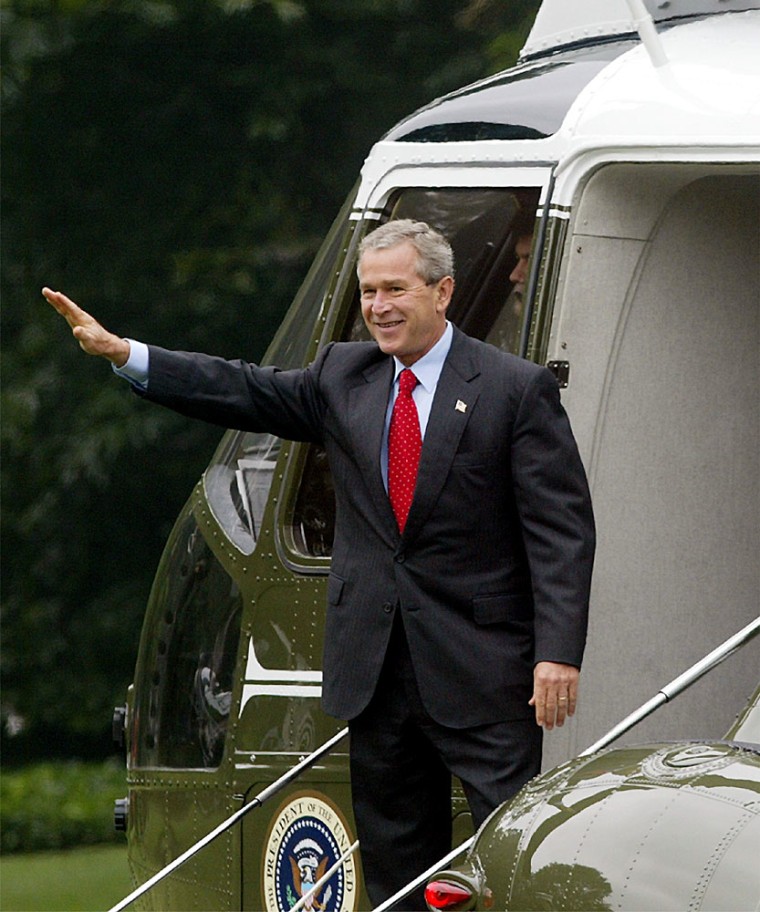From his unremarkable State of the Union address to the 360th slain U.S. soldier in Iraq, this has been a disastrous year for President Bush. And yet, he’s tied with John Kerry in his race for re-election.
How can that be?
Democrats say it’s only a matter of time before events take their toll on Bush. His job approval rating is at a dangerously low level for an incumbent, and a majority of Americans believe their country is on the wrong track.
Republicans say it’s a sign of weakness that Kerry hasn’t pulled ahead during Bush’s slump. The Massachusetts senator’s personal approval ratings are almost as low as the president’s, thanks to $80 million in Bush campaign commercials that labeled Kerry a flip-flopping, tax-raising, soft-on-terrorism liberal.
Independent analysts say at least 80 percent of voters are partisan — they picked sides long ago and are evenly split between Bush and Kerry. That leaves a precious few swing voters waiting to tip the balance.
No rush to judgment
While they are increasingly disenchanted with Bush’s performance, swing voters seem in no rush to judgment.
“It is still tight because the public is still deliberating about Bush and they haven’t moved on yet to considering Kerry,” said Andrew Kohut, an independent pollster with the Pew Research Center.
Bush is not the first president to hold his own in polls while events tumble against him. “It takes a lot to vote a president out of office,” Kohut said. “There’s a tendency to stay the course.”
That may be the only thing keeping Bush afloat amid a raft of bad news, much of it his own making. The lowlights include:
- Bush delivers a State of the Union address, with his opposition to performance-enhancing drugs in sports standing out against a bleak roster of new policies.
- Former Treasury Secretary Paul O’Neill writes a book claiming Bush was determined from the get-go to overthrow Iraq’s Saddam Hussein.
- The president’s shaky performance on NBC’s “Meet the Press” fuels anxiety among GOP allies about Iraq and the fledgling re-election campaign.
- Richard Clarke, the top counterterrorism official for Presidents Clinton and Bush, undercuts the president’s tough-on-terrorism claims during congressional testimony.
- National security adviser Condoleezza Rice at first refuses to testify before the Sept. 11 commission, then bows to pressure.
- Bush’s economic adviser, N. Gregory Mankiw, says the transfer of U.S. jobs overseas is sometimes a good thing.
- Bush scuttles plans to name Anthony Raimondo as manufacturing czar after Democrats point out that the businessman’s company laid off 75 workers in 2002 while announcing the construction a $3 million plant in China.
- The death toll in Iraq mounts through the spring as Republican governors, busy attending funerals of slain servicemen and shipping National Guard troops overseas, warn the White House that voters are getting antsy.
- Four U.S. contractors are killed and mutilated near Baghdad.
- Train bombers strike Madrid. Voters throw the Bush-backing Spanish government out of power. Spain later withdraws its troops from Iraq.
- Vice President Dick Cheney comes under fire for past business ties, secretive deliberations on energy policy and unsubstantiated suggestions that his office might be behind the leak of a CIA operative’s name.
- U.S. weapons inspector David Kay concludes that Iraq did not have stockpiles of forbidden weapons, undercutting Bush’s main justification for war.
- Democrats unite behind Kerry after a short nomination fight, allowing him to raise record amounts of money and turn quickly against Bush.
- Democratic lawmakers call for an investigation into whether the Bush administration’s Medicare chief pressured a subordinate to withhold estimates of the cost of last year’s Medicare legislation.
- Clarke follows his testimony with a book claiming Bush was so preoccupied with Iraq both before and after the Sept. 11 attacks that he failed to effectively confront threats from al-Qaida.
- Gas prices top $2 per gallon.
- Revelations that U.S. soldiers abused prisoners in Iraq fuel anti-American sentiment in the Muslim world and raise questions at home about U.S. moral authority in Iraq.
- Militants linked to al-Qaida behead American Nicholas Berg.
- The leader of Iraqi’s governing council is assassinated.
- A memo reveals plans for the Bush administration to slash domestic programs after the Nov. 2 presidential election.
- Al-Qaida militants in Saudi Arabia behead American helicopter technician Paul M. Johnson Jr.
- Militants in Iraq behead South Korean Kim Sun-il.
- Insurgents launch coordinated attacks in Iraq that kill more than 100 people, including three U.S. soldiers.
That happened Thursday, the same day the FBI questioned Bush in the CIA leak case. Hours later, Bush was flying to Turkey to plead with NATO for help in quelling Iraqi violence.
Kerry stayed on the campaign trail, seeking advantage from the president’s woes.
